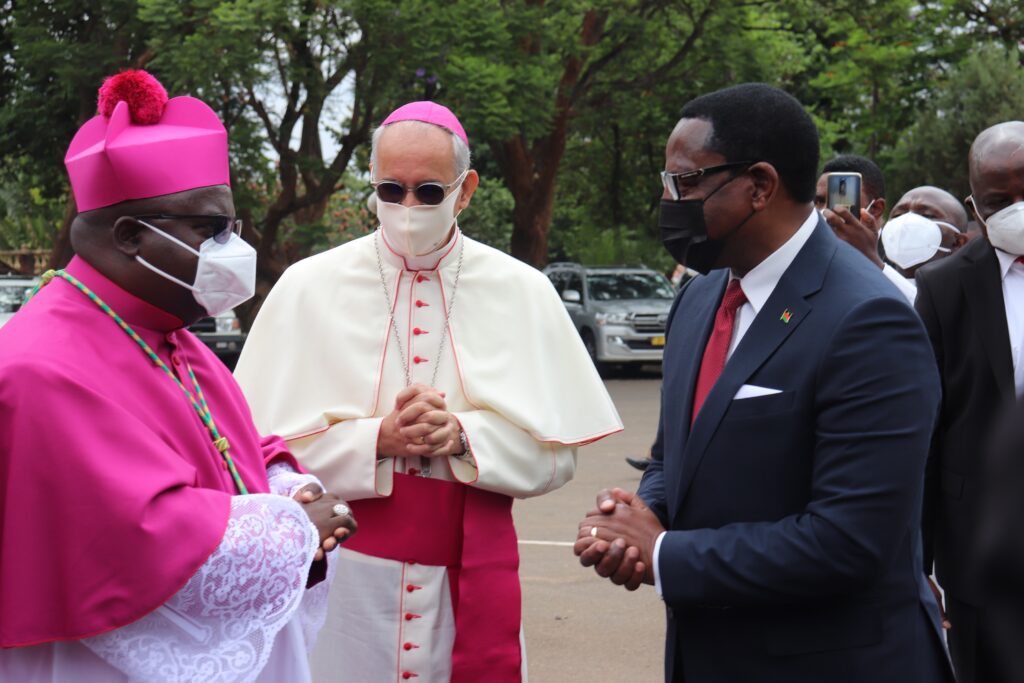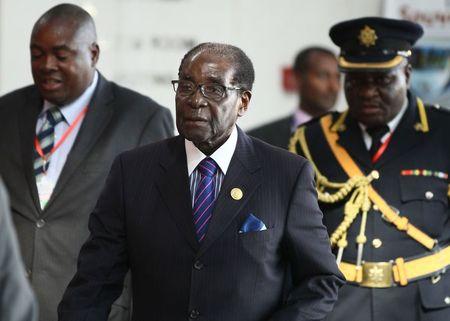Malawi : Catholic Bishops Rubbish Government On Alarming Levels Of Poverty
October 11, 2022
By Samuel Ouma
[caption id="attachment_101278" align="alignnone" width="1024"] File Picture.President Lazarus Chakwera arrives at Maula Cathedral for installation of RT. REV. Desmond Tambala as Bishop of Lilongwe,Photo courtesy[/caption]
The Catholic Bishops in Malawi have castigated President Lazarus Chakwera’s Government of failing to lift the lives of Malawians from abject poverty.
In a letter dated October 10, 2022, the bishops under the umbrella Episcopal Conference of Malawi said biting food prices, rising youth unemployment, hiked school fees, inadequate medical services, and the fuel crisis driving up transport costs have left millions of Malawians languishing in poverty.
Malawians have also been negatively affected by unscrupulous traders and business people who exploit them, foreign exchange shortages, and a lack of adequate consumer protection.
The bishops highlighted some areas President Chakwera has failed to address, including the fight against corruption. Other areas are the Defective Service Delivery System, inconsistent government austerity measures, a bleak picture of the oncoming crop growing season, and the Tonse alliance's retrogressive way of governing.
The catholic church noted that corruption is becoming an accepted way of doing things in Malawi, causing havoc across several arenas of governance and service provision. According to the bishops, graft cases involving high profiles are being eliminated, and certain bureaucratic elements within the legal and institutional framework have deliberately derailed the fight against corruption.
“We, the Catholic Bishops in Malawi, are deeply disturbed to note that some of the long-time defenders of the poor of the poorest in our country have now become spokespersons of the powerful and the rich – leaving the weakest citizens of our country groping in the dark alone in search of economic justice," read part of the statement.
On defective service delivery system, the men in cloth claimed the provision of services in the South African nation has been hampered by inadequate funding, shortage of essential commodities, poor attitude of already demotivated public servants, and interrupted essential services and goods such as the provision of electricity and fuel. They stated that it is unjust for the larger citizenry to be served with poor and substandard services while the governing elite privately enjoys high-quality services funded by the poor taxpayers.
They also expressed concern about food security, stating that it depends on the Affordable Inputs Programme (AIP), whose viability has been hampered by institutional and operational problems. The bishops identified several challenges, including poor planning and coordination, a lack of proper review of AIP implementation in the previous season, poor information sharing with AIP stakeholders, and general uncertainty about the program.
"The AIP programme does not inspire confidence in people for the coming growing season. The prospect of food insecurity looms large," the bishops added.
They also expressed concerns about the Tonse Alliance governance style, citing internal quarrels, jockeying for political influence, favoritism, nepotism, focusing on narrow selfish political interests, and disorganized stances on public policy by alliance partners.
The Bishops want the Anti-Corruption Bureau (ACB), the Directorate of Public Prosecutions (DPP), the Attorney General, the Financial Intelligence Authority (FIA), and the Fiscal Police to combat rampant graft in the nation.
They also demand the Public Sector Review Systems Taskforce’s report be made public and acted upon without further delay, national leadership institute and enforce standard measures, implementation of the 2022/2023 AIP, and an end to worthless politicking by leaders.
They called on the Office of the President and Cabinet (OPC) to demonstrate by example the enforcement of government austerity measures and ensure the implementation of the public sector reforms.
The Bishops further called for the introduction of social protection measures to cushion the sufferings of the poor and effective safeguards to protect consumers from an often hostile and exploitative commodity market—also the Government to institute workable corrective mechanisms to reduce the effects of the unstable macroeconomic environment.
File Picture.President Lazarus Chakwera arrives at Maula Cathedral for installation of RT. REV. Desmond Tambala as Bishop of Lilongwe,Photo courtesy[/caption]
The Catholic Bishops in Malawi have castigated President Lazarus Chakwera’s Government of failing to lift the lives of Malawians from abject poverty.
In a letter dated October 10, 2022, the bishops under the umbrella Episcopal Conference of Malawi said biting food prices, rising youth unemployment, hiked school fees, inadequate medical services, and the fuel crisis driving up transport costs have left millions of Malawians languishing in poverty.
Malawians have also been negatively affected by unscrupulous traders and business people who exploit them, foreign exchange shortages, and a lack of adequate consumer protection.
The bishops highlighted some areas President Chakwera has failed to address, including the fight against corruption. Other areas are the Defective Service Delivery System, inconsistent government austerity measures, a bleak picture of the oncoming crop growing season, and the Tonse alliance's retrogressive way of governing.
The catholic church noted that corruption is becoming an accepted way of doing things in Malawi, causing havoc across several arenas of governance and service provision. According to the bishops, graft cases involving high profiles are being eliminated, and certain bureaucratic elements within the legal and institutional framework have deliberately derailed the fight against corruption.
“We, the Catholic Bishops in Malawi, are deeply disturbed to note that some of the long-time defenders of the poor of the poorest in our country have now become spokespersons of the powerful and the rich – leaving the weakest citizens of our country groping in the dark alone in search of economic justice," read part of the statement.
On defective service delivery system, the men in cloth claimed the provision of services in the South African nation has been hampered by inadequate funding, shortage of essential commodities, poor attitude of already demotivated public servants, and interrupted essential services and goods such as the provision of electricity and fuel. They stated that it is unjust for the larger citizenry to be served with poor and substandard services while the governing elite privately enjoys high-quality services funded by the poor taxpayers.
They also expressed concern about food security, stating that it depends on the Affordable Inputs Programme (AIP), whose viability has been hampered by institutional and operational problems. The bishops identified several challenges, including poor planning and coordination, a lack of proper review of AIP implementation in the previous season, poor information sharing with AIP stakeholders, and general uncertainty about the program.
"The AIP programme does not inspire confidence in people for the coming growing season. The prospect of food insecurity looms large," the bishops added.
They also expressed concerns about the Tonse Alliance governance style, citing internal quarrels, jockeying for political influence, favoritism, nepotism, focusing on narrow selfish political interests, and disorganized stances on public policy by alliance partners.
The Bishops want the Anti-Corruption Bureau (ACB), the Directorate of Public Prosecutions (DPP), the Attorney General, the Financial Intelligence Authority (FIA), and the Fiscal Police to combat rampant graft in the nation.
They also demand the Public Sector Review Systems Taskforce’s report be made public and acted upon without further delay, national leadership institute and enforce standard measures, implementation of the 2022/2023 AIP, and an end to worthless politicking by leaders.
They called on the Office of the President and Cabinet (OPC) to demonstrate by example the enforcement of government austerity measures and ensure the implementation of the public sector reforms.
The Bishops further called for the introduction of social protection measures to cushion the sufferings of the poor and effective safeguards to protect consumers from an often hostile and exploitative commodity market—also the Government to institute workable corrective mechanisms to reduce the effects of the unstable macroeconomic environment.






 File Picture.President Lazarus Chakwera arrives at Maula Cathedral for installation of RT. REV. Desmond Tambala as Bishop of Lilongwe,Photo courtesy[/caption]
The Catholic Bishops in Malawi have castigated President Lazarus Chakwera’s Government of failing to lift the lives of Malawians from abject poverty.
In a letter dated October 10, 2022, the bishops under the umbrella Episcopal Conference of Malawi said biting food prices, rising youth unemployment, hiked school fees, inadequate medical services, and the fuel crisis driving up transport costs have left millions of Malawians languishing in poverty.
Malawians have also been negatively affected by unscrupulous traders and business people who exploit them, foreign exchange shortages, and a lack of adequate consumer protection.
The bishops highlighted some areas President Chakwera has failed to address, including the fight against corruption. Other areas are the Defective Service Delivery System, inconsistent government austerity measures, a bleak picture of the oncoming crop growing season, and the Tonse alliance's retrogressive way of governing.
The catholic church noted that corruption is becoming an accepted way of doing things in Malawi, causing havoc across several arenas of governance and service provision. According to the bishops, graft cases involving high profiles are being eliminated, and certain bureaucratic elements within the legal and institutional framework have deliberately derailed the fight against corruption.
“We, the Catholic Bishops in Malawi, are deeply disturbed to note that some of the long-time defenders of the poor of the poorest in our country have now become spokespersons of the powerful and the rich – leaving the weakest citizens of our country groping in the dark alone in search of economic justice," read part of the statement.
On defective service delivery system, the men in cloth claimed the provision of services in the South African nation has been hampered by inadequate funding, shortage of essential commodities, poor attitude of already demotivated public servants, and interrupted essential services and goods such as the provision of electricity and fuel. They stated that it is unjust for the larger citizenry to be served with poor and substandard services while the governing elite privately enjoys high-quality services funded by the poor taxpayers.
They also expressed concern about food security, stating that it depends on the Affordable Inputs Programme (AIP), whose viability has been hampered by institutional and operational problems. The bishops identified several challenges, including poor planning and coordination, a lack of proper review of AIP implementation in the previous season, poor information sharing with AIP stakeholders, and general uncertainty about the program.
"The AIP programme does not inspire confidence in people for the coming growing season. The prospect of food insecurity looms large," the bishops added.
They also expressed concerns about the Tonse Alliance governance style, citing internal quarrels, jockeying for political influence, favoritism, nepotism, focusing on narrow selfish political interests, and disorganized stances on public policy by alliance partners.
The Bishops want the Anti-Corruption Bureau (ACB), the Directorate of Public Prosecutions (DPP), the Attorney General, the Financial Intelligence Authority (FIA), and the Fiscal Police to combat rampant graft in the nation.
They also demand the Public Sector Review Systems Taskforce’s report be made public and acted upon without further delay, national leadership institute and enforce standard measures, implementation of the 2022/2023 AIP, and an end to worthless politicking by leaders.
They called on the Office of the President and Cabinet (OPC) to demonstrate by example the enforcement of government austerity measures and ensure the implementation of the public sector reforms.
The Bishops further called for the introduction of social protection measures to cushion the sufferings of the poor and effective safeguards to protect consumers from an often hostile and exploitative commodity market—also the Government to institute workable corrective mechanisms to reduce the effects of the unstable macroeconomic environment.
File Picture.President Lazarus Chakwera arrives at Maula Cathedral for installation of RT. REV. Desmond Tambala as Bishop of Lilongwe,Photo courtesy[/caption]
The Catholic Bishops in Malawi have castigated President Lazarus Chakwera’s Government of failing to lift the lives of Malawians from abject poverty.
In a letter dated October 10, 2022, the bishops under the umbrella Episcopal Conference of Malawi said biting food prices, rising youth unemployment, hiked school fees, inadequate medical services, and the fuel crisis driving up transport costs have left millions of Malawians languishing in poverty.
Malawians have also been negatively affected by unscrupulous traders and business people who exploit them, foreign exchange shortages, and a lack of adequate consumer protection.
The bishops highlighted some areas President Chakwera has failed to address, including the fight against corruption. Other areas are the Defective Service Delivery System, inconsistent government austerity measures, a bleak picture of the oncoming crop growing season, and the Tonse alliance's retrogressive way of governing.
The catholic church noted that corruption is becoming an accepted way of doing things in Malawi, causing havoc across several arenas of governance and service provision. According to the bishops, graft cases involving high profiles are being eliminated, and certain bureaucratic elements within the legal and institutional framework have deliberately derailed the fight against corruption.
“We, the Catholic Bishops in Malawi, are deeply disturbed to note that some of the long-time defenders of the poor of the poorest in our country have now become spokespersons of the powerful and the rich – leaving the weakest citizens of our country groping in the dark alone in search of economic justice," read part of the statement.
On defective service delivery system, the men in cloth claimed the provision of services in the South African nation has been hampered by inadequate funding, shortage of essential commodities, poor attitude of already demotivated public servants, and interrupted essential services and goods such as the provision of electricity and fuel. They stated that it is unjust for the larger citizenry to be served with poor and substandard services while the governing elite privately enjoys high-quality services funded by the poor taxpayers.
They also expressed concern about food security, stating that it depends on the Affordable Inputs Programme (AIP), whose viability has been hampered by institutional and operational problems. The bishops identified several challenges, including poor planning and coordination, a lack of proper review of AIP implementation in the previous season, poor information sharing with AIP stakeholders, and general uncertainty about the program.
"The AIP programme does not inspire confidence in people for the coming growing season. The prospect of food insecurity looms large," the bishops added.
They also expressed concerns about the Tonse Alliance governance style, citing internal quarrels, jockeying for political influence, favoritism, nepotism, focusing on narrow selfish political interests, and disorganized stances on public policy by alliance partners.
The Bishops want the Anti-Corruption Bureau (ACB), the Directorate of Public Prosecutions (DPP), the Attorney General, the Financial Intelligence Authority (FIA), and the Fiscal Police to combat rampant graft in the nation.
They also demand the Public Sector Review Systems Taskforce’s report be made public and acted upon without further delay, national leadership institute and enforce standard measures, implementation of the 2022/2023 AIP, and an end to worthless politicking by leaders.
They called on the Office of the President and Cabinet (OPC) to demonstrate by example the enforcement of government austerity measures and ensure the implementation of the public sector reforms.
The Bishops further called for the introduction of social protection measures to cushion the sufferings of the poor and effective safeguards to protect consumers from an often hostile and exploitative commodity market—also the Government to institute workable corrective mechanisms to reduce the effects of the unstable macroeconomic environment.


























